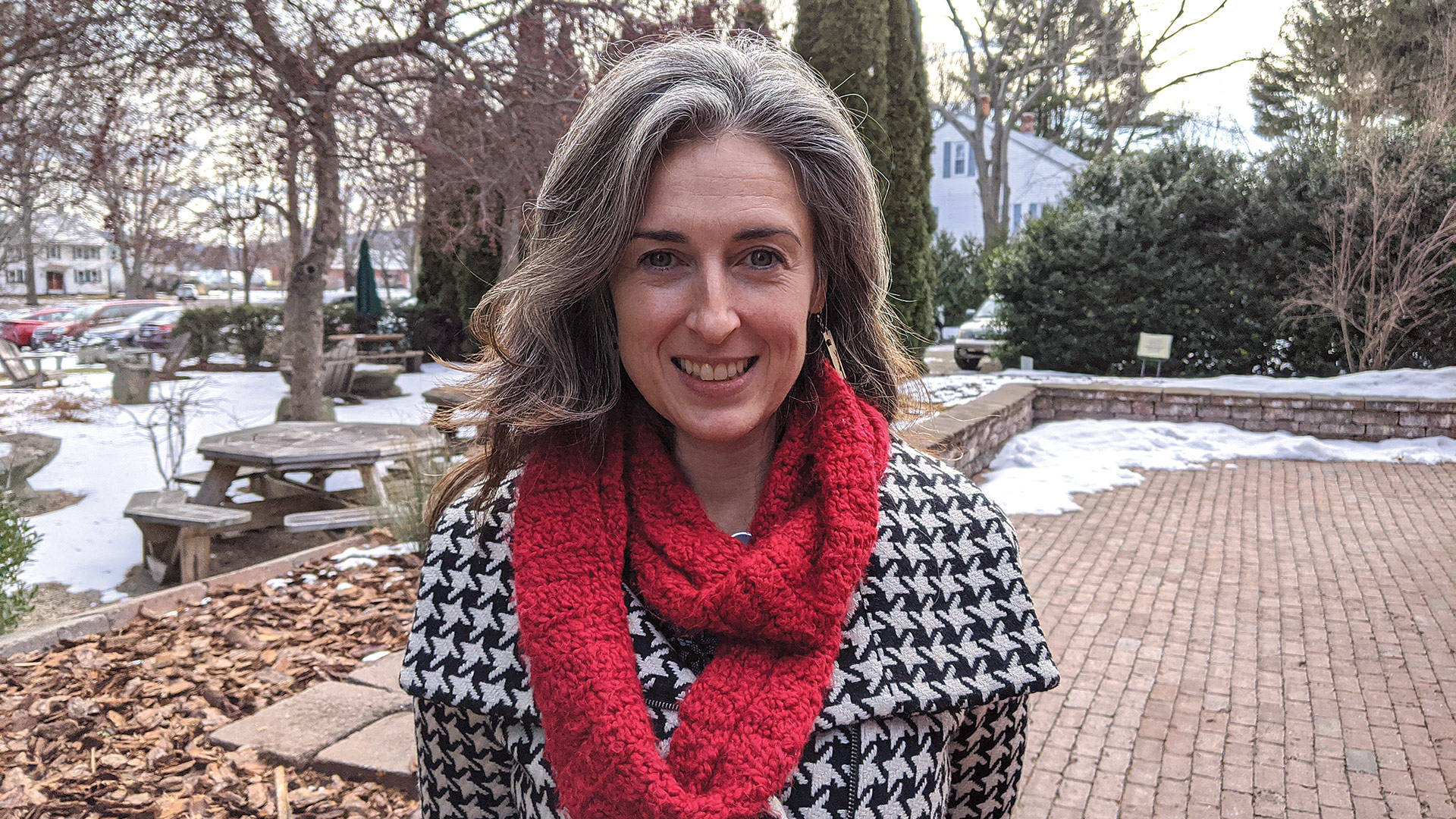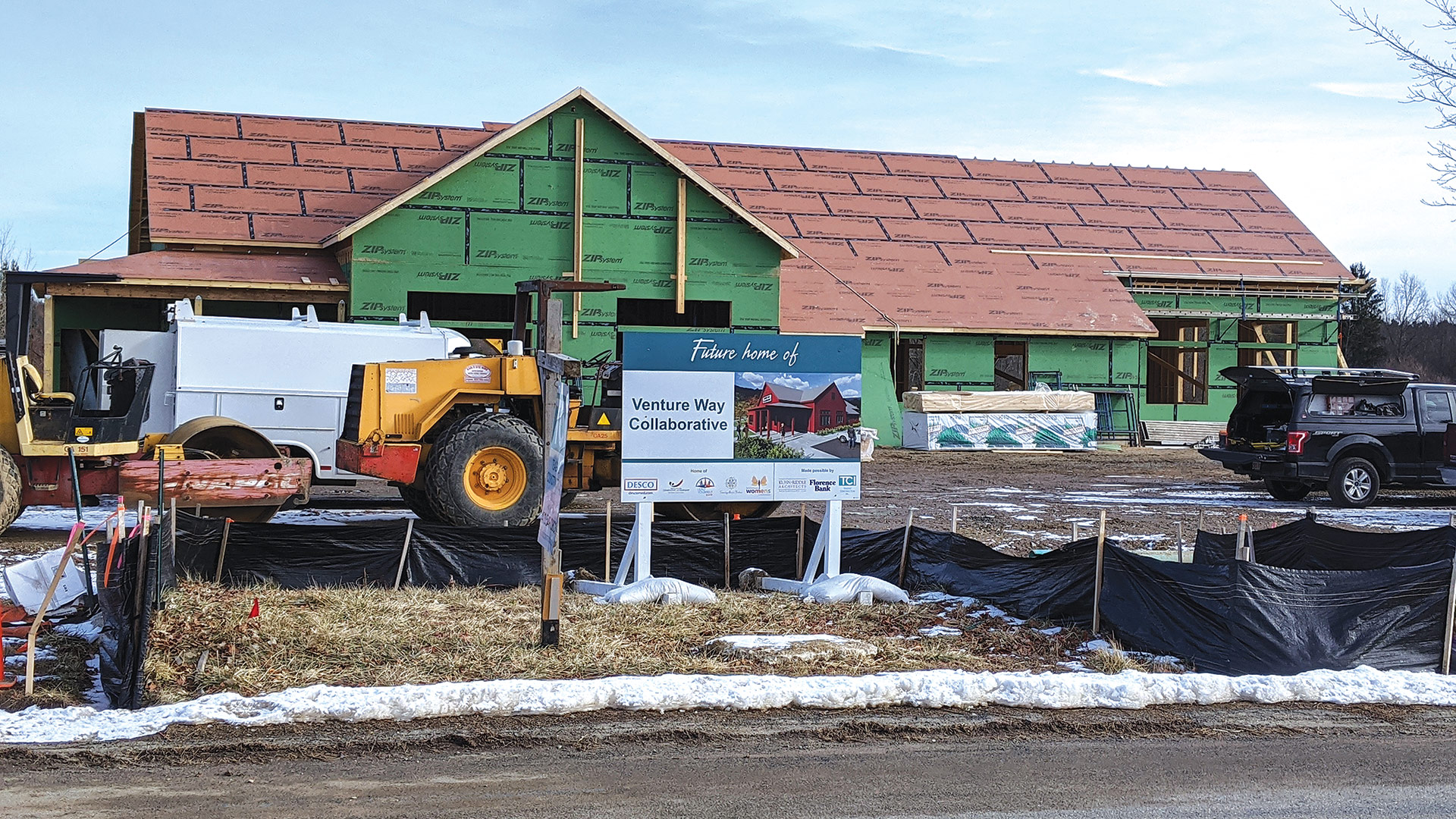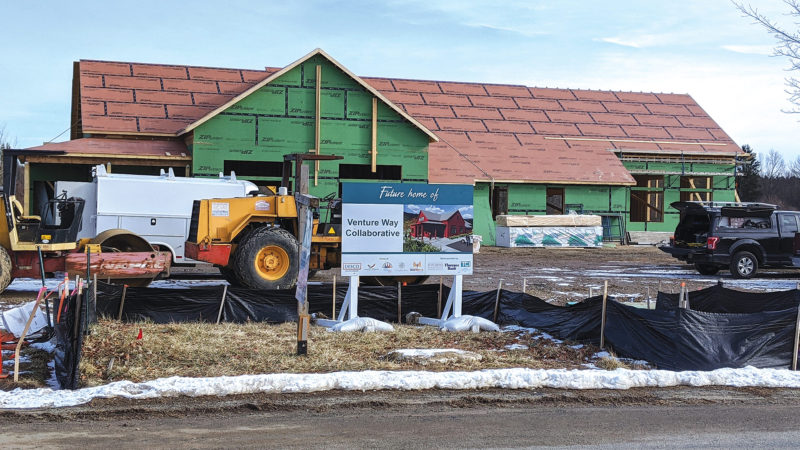Venture Way Collaborative Building to Promote Holistic Approach
An Innovative Model
By Joseph Bednar

Everyone has a story they tell themselves, Andrea Bordenca says, and hers, growing up, was not a positive one.
“My story was that I was not a good student, that I wasn’t smart,” she told HCN, adding that her struggles in school and with self-esteem were compounded by unhealthy coping mechanisms — she was drinking at age 12, smoking at 14, and became addicted to both — and an ADHD diagnosis … and addiction to her medications to treat that.
“Because I didn’t have healthy coping mechanisms, it got worse into adulthood — I felt depressed and undervalued; I didn’t see my own worth,” she went on, adding that she was hospitalized at one point for suicide risk. Achieving the dean’s list at Roger Williams University, followed by some career success, demonstrated that she was smart, but she still struggled with those other issues — until she encountered the Institute for Generative Leadership (IGL), an organization committed to bringing leadership skills to adults through stress physiology and self-care practices.
“At IGL, they asked, ‘what do you care about?’ I didn’t have an answer. I was getting so lost in everyone’s expectations that I’d lost my sense of self,” she recalled, adding that money and career success are good, but not a source of meaning for her. “For me, it’s community, it’s people. That’s what was missing, and I didn’t realize that was the missing piece.”
“Because I didn’t have healthy coping mechanisms, it got worse into adulthood — I felt depressed and undervalued; I didn’t see my own worth.”
The leadership program she undertook at IGL 20 years ago showed her “how we tend to culturally operate from place of other people’s expectations,” she explained. “We’re told from a certain age what we’re good at and what we’re not good at. What’s missing is, what do I care about? What do I want to do in this world?”
These days, Bordenca is in a much healthier place, as both the second-generation CEO of DESCO, a healthcare emergency field-service response organization, and also CEO of — that’s right — IGL. She’s also building a $1.5 million collaborative in Hadley with a goal of connecting area businesses and their professional-development initiatives with healing modalities for adults and youth.
Teagno Construction broke ground on the Venture Way Collaborative Building at 200 Venture Way on Dec. 20. It’s expected to open in May.

“I’m bridging the gap between the increase in depression, suicide, and anxiety among younger populations and the health and vitality of corporate cultures and healthy businesses,” she said, noting that the building will also offer classroom space, as well as hands-on learning and workshop space for DESCO. “My way of bridging that gap is by bringing social-emotional learning to young people so they can learn the essential life skills of communication and self-awareness, so when they are our employees and leaders of the future, they have basic, foundational life skills.”
Interconnected Initiatives
The Venture Way Collaborative Building will host a number of businesses, most connected in some way to Bordenca’s work as a serial entrepreneur:
• DESCO (Diagnostic Equipment Service Corp.) responds to emergencies primarily in the healthcare industry but also in controlled lighting and hospitality. If a piece of equipment breaks in an operating room, for instance, or an ice machine fails in a restaurant’s kitchen, DESCO has teams that respond, she explained. It also installs advanced lighting controls in schools, stadiums, libraries, and department stores. DESCO, founded by Bordenca’s father, now has locations in 17 states, and the Hadley building will become its home base. The company has 60 employees and serves businesses across the country.
• The Institute for Generative Leadership will also be housed at Venture Way. Bordenca said IGL has positively influenced DESCO by helping her change her leadership style and dramatically boost retention rates. IGL will have a 1,000-square-foot classroom in the new building and will offer educational opportunities to support the community in body-based practices that increase physical, mental, and emotional health.
“I’ve been a practitioner of this methodology for 20 years and have been able to overcome issues associated with ADHD, bipolar disorder, social anxiety, and addiction,” she added. “I’m motivated by having healthy people in healthy organizations and see this as an opportunity for us to train and retain Western Massachusetts talent.”
Some attendees of IGL coaching programs are self-sponsored, while others are sponsored by their employers. “We’re going after small to medium-sized businesses that want to grow but feel stuck,” she told HCN. “The leaders come, and then sponsor their teams to come because they see an immediate impact on their organizations.”
She tells a story of how her son, who had dealt with severe social anxiety issues his entire childhood, begin to overcome them by secretly practicing the techniques she was learning from IGL — and she began to see how other teens could be positively influenced. That led to:
• Lead Yourself Youth, an initiative Bordenca created in 2016 that adapts IGL curriculum so it is relevant for educators and adolescents. She and her partner in the venture, Sara Vatore, aim to bring awareness about life decisions, standards, and relationships to youth, and they’re interested in collaborating with leaders from area high schools, colleges and universities, and organizations such as Girl and Boy Scouts, Girls Inc., and boys and girls clubs.
She said teens are especially likely to fall into the trap of losing their sense of self and living according to external expectations. “Here, they’ll learn they don’t need everyone’s acceptance. Once they do, we’re going to have that much more relient and able employees and leaders in the future.
“I’ve been a practitioner of this methodology for 20 years and have been able to overcome issues associated with ADHD, bipolar disorder, social anxiety, and addiction. I’m motivated by having healthy people in healthy organizations and see this as an opportunity for us to train and retain Western Massachusetts talent.”
“We don’t have to accept everyone’s assessment of us,” she added, noting that those external assessments affect people’s self-esteem. “I’ve found most teenagers are very open to this conversation, when they realize they can decline the assessments of people who don’t like who they are and realize, ‘no I don’t like everybody, either, and that’s a fact of life.’ As an adult, you’re going to meet people you like and don’t like. So if we get clear now on who you are and the people you want to surround yourself with, then that’s going to help you find your people, your tribe, moving forward.”
There’s an emotional-literacy component to this work, too, she added, as it’s important for young people — and all people, really — not to be afraid of their emotions, but to understand how they affect us, then deal with them and shift them in a healthy way.
Other enterprises at the new building will include:
• Somasynthesis, led by Vatore, who works with adolescents, educators, and professionals to break the cycles of burnout through integrating nervous-system education and applied practices to ease tension; and
• The Women’s Collaborative, co-founded by Bordenca and Gina Fasser, which is a group of women in the Pioneer Valley who come together to talk about who they are and what’s possible in terms of goals and achievements.
“Everyone has a voice here,” Bordenca explained. “People start sharing stories because it’s finally bringing to the surface all the emotions that all of us feel that perhaps we didn’t realize, because we get so alone in our heads. All of a sudden, we hear other women, and say, ‘oh, you’re human too?’”
Overcoming Stigma
In short, Bordenca wants to reduce the stigma around issues like emotional health, self-awareness, self-esteem, and any number of issues that affect mental health and overall wellness.
“Worry, anxiety, despair, it’s all OK, it’s all normal. What makes people feel isolated is when they’re afraid to talk about it,” she told HCN. “This Venture Way Collaborative is all about bringing these emotions to the surface. It’s OK to feel crappy sometimes; it’s OK to feel hopeless sometimes.”
Dealing honestly with those issues can help reveal what’s missing in one’s life, she added, and open up deeper questions that need to be addressed, rather than pushing through with unhealthy coping mechanisms like alcohol.
As she learned early in her own life, and what she’s trying to communicate to others of all ages, is that succumbing to peer pressure is a response to the fear of isolation in people who haven’t learned to value their own voice and desires over the expectations of others.
“They want to feel connected, so they drink and smoke. So how do we create that space for kids where they talk about these issues in a way that normalizes their emotions and fear of being left out, so there’s less of, ‘OK, I’ll drink and smoke to be part of the crowd.’ We’re creating communities of kids able to voice their concerns.”
Bordenca has dramatically changed her internal story, the one she tells herself, and she likes what she hears. It’s a lesson applicable to people of all ages, and she hopes the Venture Way Collaborative Building provides a healthy resource for many of them in the years to come.



